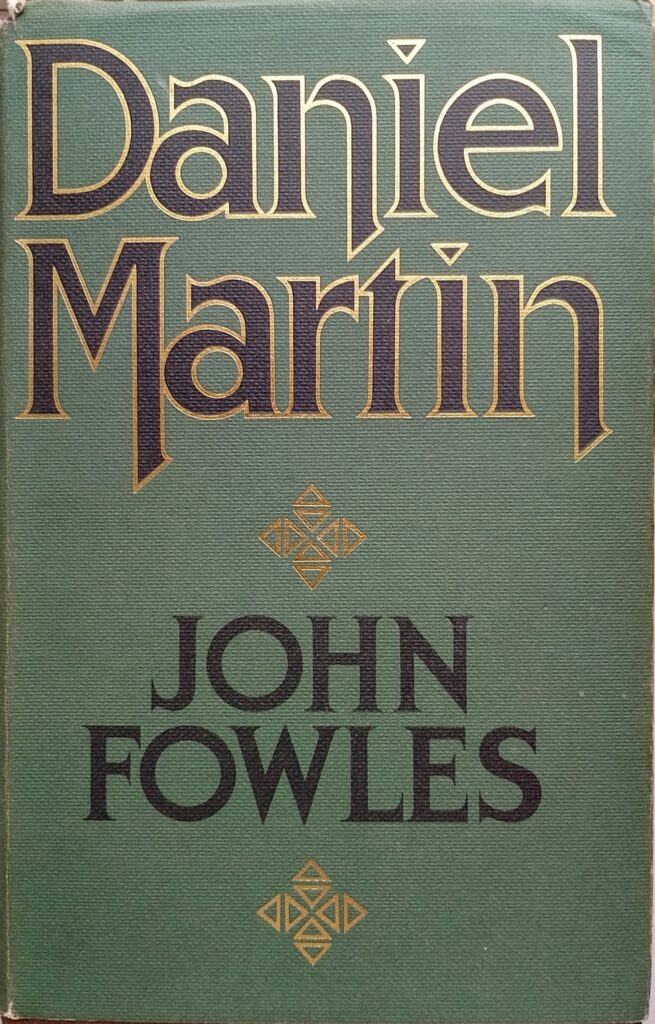First published 1977. Johnathan Cape hardback, 1977, pp 704, c.265,000 words.
The trouble with being a very successful writer is that when your next book is a turkey everyone is going to tell you it’s a swan. Fowles is quite capable of writing some really elegant and powerful prose and putting that together with absorbing story-telling. There are flashes of that in this book, but unfortunately those passages are bogged down in a structural mess. It is a hugely long novel, and would have been far better split into three: a story about growing up in England in the 1940s and 1950s, a travel memoir featuring the Nile and Palmera, and a philosophical exploration of the late twentieth century. The third part could then be quietly dropped in the bin as the uninteresting undergraduate essay that it is. We would then have been left with two books worth reading.
The story (to grace it with a name it doesn’t deserve) opens in rural Devon in about 1940. It is a finely evoked Hardyesque world in the golden sunset of a bygone age, with horses still doing much of the agricultural traction. The rural idyll, with much of the village, including the vicar’s son, the titular character, turned out to get the harvest in, is rudely interrupted by the passing low overhead of German bomber. Then the time shifts to 1970s Los Angeles and Daniel Martin is a successful screenwriter, now with a beautiful young starlet, only he is unable to enjoy the moment, too bound up with the mirrors of illusion of the film world and his own conscience. A few pages later we are in 1950s Oxford and we have a scene that might be from the deleted edits of Brideshead Revisited. It veers through passages that might be sub-Graham Greene and Noel Coward – with a load of brittle dialog that is hugely unreal, despite occasional attempts to make it hyper-real with all the little tics and manners that real speech takes but that is dull and difficult to read. This is particularly glaring because Daniel Martin, as a successful scriptwriter, surely should be a master of dialog. It is a reimagining of Brief Encounter as Grossly Protracted Encounter, with Catholic angst thrown in.
Fowles is quoted on the dust jacket as saying the book is ‘an exploration of what it is to be English’. If so, it is a very limited Englishness: confined to a moneyed, professional, theatrical world. C. P. Snow uses a much broader canvas to explore the same subject to much more convincing effect. There is also a rather bad taste left by any idea of nationalism, one that verges dangerously close to racism. The book is also very much a male fantasy with the protagonist bedding a stream of beautiful women. The women are never convincing. Towards the end, the Daniel Martin character says: ‘Anthony should have been a priest. You should have been my wife. I should have tried to be a serious playwright’ [p657]. That just about sums it up: The woman, who was a promising actress and intellectual equal of the men at Oxford, should, in Fowles view, have been some chap’s wife.
The politics, philosophy and religion are all over the place: A woman, in mid-life, declares that she is intent on becoming a communist but then says: ‘I have a rather symptomatic longing to renounce all my money. I can’t in fact, obviously it’s morally in trust for the children’ [p433]. So much for the abolition of private capital and inherited privilege. Another character is a fervent life-long Catholic, who for no apparent reason commits suicide shortly before his inevitable death from cancer.
There are some fine descriptions of a trip by luxury boat down the Nile and visit to Palmera in bad weather. They read as though they are Fowles’ memoire. Cutting out the philosophical interludes, there is some fine descriptive writing here, as in the rural-England and American city and country scenes.
Fowles is a high-brow writer, peppering his work with little-used words such as ‘mimesis’ [p25], ‘foulard’ [p48], ‘couvade’ [p123], ‘agapicide’ [p151], etc., etc. For those of us less fond of the dictionary they provided distracting bumps in the prose. Sometimes the sentence structure is so convoluted and clumsy that the meaning is not immediately apparent, e.g. ‘He had had all of their second breakfast to realize, and other occasions when she had taken off her gloves, but even usually observant men are peculiarly blind at times’ [p686]. Fowles also uses different points of view – several characters get their turn. What is most distracting is when he uses the first and third person together in a paragraph, and sometimes even in a sentence. Occasionally we get the omniscient author’s view on proceedings.. Not clever.
Wikipedia biography of Fowles: https://en.wikipedia.org/wiki/John_Fowles
Wikipedia Summary of the book: https://en.wikipedia.org/wiki/Daniel_Martin_(novel)
Others’ reviews of the book: https://www.goodreads.com/book/show/57529.Daniel_Martin?from_search=true&from_srp=true&qid=21QEAeML3Q&rank=1
© William John Graham, August 2024

